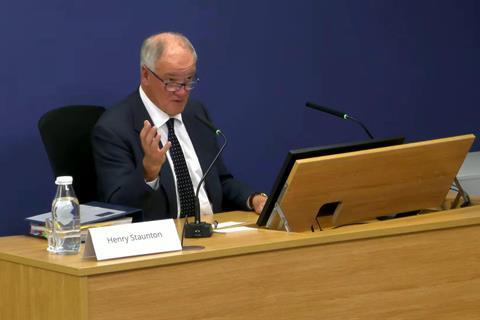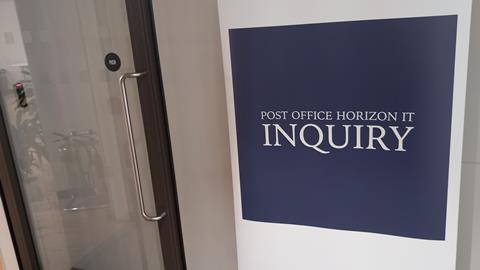More details have emerged of strained relations among top executives at the Post Office amid allegations that the organisation's chair applied ‘improper pressure’ to his general counsel.
An independent review shared with the Post Office Inquiry lifted the lid on the treatment of lawyer Ben Foat, which at one point left him so upset he had to break off from talking about it.
Foat was the subject of stinging criticism from former Post Office chair Henry Staunton at the inquiry earlier this week. The inquiry heard that Staunton wrote of Foat in an email to the chief executive in December 2023 that: ‘I have never had a legal counsel in whose judgement I have so little faith’.
But the review of senior management suggested that the chair subjected his senior lawyer to hostile conversations after he began an internal investigation into misconduct allegations.

The review was conducted by barrister Marianne Tutin, of Devereux Chambers, who was instructed by the Post Office’s lawyers Pinsent Masons to investigate allegations of potential wrongdoing, bullying and sexist behaviour by the organisation and named individuals. Her findings were set out in a witness statement put before the inquiry this week.
The allegations were initially made by Jane Davies, the Post Office’s former chief people officer, through the company’s Speak Up system. These were reported to Foat, who was the original commissioning executive for the whistleblowing policy.
Staunton’s conduct was the subject of one allegation in addition to others involving chief executive Nick Read and the board generally.
Tutin reported that she interviewed Foat in January this year about potential interference into the investigation by Staunton and whether the chair was behaving in a potentially discriminatory manner.
Foat was said to be ‘hesitant’ to answer and wanted to know if Staunton would see the investigation report. At one point the general counsel became so distressed that he had to take a break, and Tutin reported that he ‘appeared intimidated’ by Staunton.
Foat later stated that Staunton’s behaviour could be ‘very aggressive’ and he had raised concerns about this formally as general counsel. Foat added that he would ‘never dare communicate’ in the way Staunton thought it appropriate to talk to people.
Tutin’s statement added: ‘Mr Foat showed some discomfort in telling me this, although I felt he was trying to help me. I was left with the impression that the professional relationship between Mr Staunton and Mr Foat was, at the very least, strained.’
It then emerged that Staunton had sent a ‘very unflattering and unpleasant’ email in part about Foat to two postmasters who sat on the board. These called into question Foat’s leadership and role within Post Office. The email was inadvertently sent to members of the board and to Foat himself by chief executive Read.
Tutin also asked for reflections from senior independent director Ben Tidswell, who chaired board meetings after Staunton’s departure in January. Tidswell said that ‘ancillary to his desire to disrupt the investigation’, Staunton had ‘behaved quite disgracefully’ towards colleagues involved in the Speak Up investigation, particularly Foat.
Tidswell believed that Staunton had suggested to Foat to drop the investigation and was ‘abusive and tough’ towards the general counsel.
In a further interview, Foat recounted that he had been pressured by Staunton to stop investigating, with the then-chair accusing him of not being ‘commercial enough’. He added that Staunton had been ‘offensive’ during a call in December 2023.
Overall, concluded Tutin, the impression was that Staunton applied ‘improper pressure’ on Foat and others to stop the Speak Up investigation from proceeding or to reduce its scope.
Foat, who has previously appeared before the inquiry to explain disclosure failings, stepped back from his work in July. It is not known if he has returned to the organisation since, but he is due to give evidence later this month as inquiry chair Sir Wyn Williams looks in detail at the Post Office's current culture and working practices.































